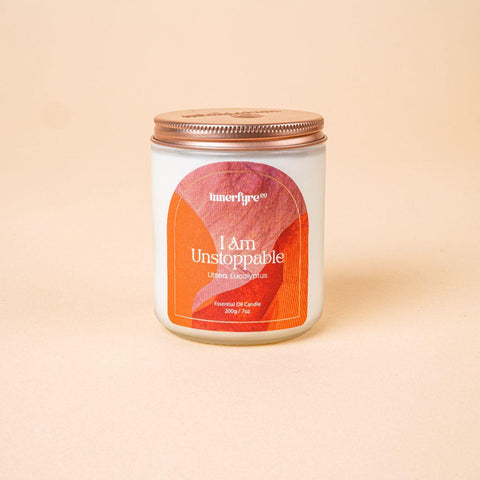
How to Find the Perfect Candle Scent For You Based on the 4 Fragrances
As you inhale a sample of perfume or take in the candle scents in a shop, you will notice that there are fragrances that immediately greet you.

As you take another sniff, these top notes fade away, revealing the fragrance's middle notes, or heart. On your next sniff: the middle notes give way to the bottom notes, sometimes known as the base notes.
All these fragrance notes contribute to your overall experience of the perfume or candle scents.
Fragrances are a symphony of top, middle, and bottom notes, with each note containing multiple scents or ingredients. Each distinct scent or ingredient naturally falls into one of the following notes:
Top Notes (Head)

The top notes, also known as the head notes, are what you smell first in candle scents or perfumes.
The ingredients that emit these notes are made up of smaller molecules that evaporate quickly. These include:
- Citrus fruits
- Aromatics
Middle Notes (Heart)

As the top notes fade, you begin to smell the middle or heart notes.
They are typically mellower and last longer than top notes. Among those considered as middle notes are:
- Floral
- Green
- Fruity
- Spices
Bottom Notes (Base)

The bottom or base notes of a fragrance add depth and solidity.
Base note ingredients have a rich and strong scent and molecules that evaporate slowly, allowing their odour to last the longest. Bottom notes include scents that are:
- Woody
- Balsamic
The Evolution of Categories for Perfumes and Candle Scents
Traditional fragrance categories emerged around 1900, but since 1945, technological advances and the natural evolution of styles and tastes have resulted in the development of new categories.
In 1983, Michael Edward, a British fragrance expert, created the Fragrance Wheel to simplify fragrance classification and demonstrate their relationship.

Fragrance types, like colours, are displayed on a wheel, and complementary notes appear across from each other.
Each distinct scent or ingredient is classified as either Fresh or Warm, and is then classified into one of four Fragrance Families. There are subfamilies within each Fragrance Family, and a few subfamilies cross two families.
Fresh Fragrances
Fresh fragrances are described as uplifting, clean, crisp, zingy, and effervescent.
You may immediately think of green notes such as grass and stem, evoking the smell of your father mowing the lawn on a dewy summer morning. Un Jardin Sur Le Toit by Hermes is an excellent example of a Green fragrance.
Fresh Family Scents

Aromatic: lavender, sage, thyme, rosemary, eucalyptus
Citrus: lemon, lime, orange, bergamot, mandarin, grapefruit
Water: rain, dew, ocean, ozone
Green: leaves, bamboo, grass, green tea, herbs, mint, cilantro, tomato leaf
Fruity: apple, cranberry, cucumber, pear, pumpkin, almond, coconut
Floral Family Scents

Fruity: raspberry, mango, melon, peach, pineapple, pomegranate
Floral: rose, jasmine, ylang-ylang lily, lotus, cotton, willow, lilac
Soft Floral: iris, linen, powdery
Floral Oriental: spicy florals
Warm Fragrances
Warm fragrances are those with rich and spicy scents.
Spices, resins, and rich opulent florals are what would immediately come to mind. Think candlelit moments of deep inspiration or seduction — they can be evoked by notes of cinnamon, cloves, amber, resin, and incense.
Oriental Family Scents

Note: There has been some recent controversy surrounding the use of the term "Oriental", and some may find it offensive.
But because traditional perfumers have not yet renamed it, we're only using it for consistency; please know that we mean no disrespect.
Soft Oriental: soft florals with incense and warm spices
Oriental: vanilla, musk, cinnamon
Woody Oriental: sweet-and-spicy, woody notes
Woody: sandalwood, patchouli, vetiver
Woody Family Scents

Woody: cedarwood, teakwood, pine,
Mossy Wood: oakmoss, amber
Dry Wood: tobacco, leather, smoke
Aromatic: fresh herbs or lavender with woody scents
Additional Fragrance Category for Perfumes and Candle Scents

Modern perfumers have recently developed new fragrance notes focusing on edible (gourmand) or more dessert-like scents such as warm sugar, caramel, graham cracker crust, chocolate, vanilla, birthday cake, or candy.
These notes function as the top and middle notes in perfumes and candle scents.
Over to You
Now that you know the 4 fragrance families and the fragrance notes in perfumes and candle scents, it’s time to determine the aromas you are drawn to.
It takes away the guesswork and ensures that you will buy something that you would really love. To fully enjoy the experience, make sure that you take note of our candle safety tips and take steps to avoid candle tunnelling.
Shop for Scented Candles in Singapore today.

